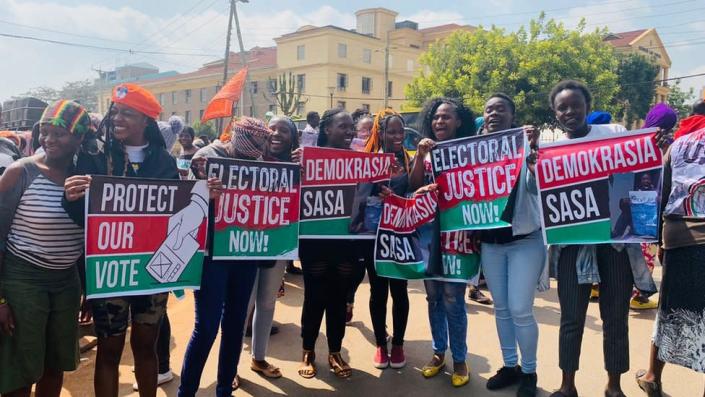
Raila Odinga, who came second in Kenya’s presidential election, has gone to court to challenge the result, describing it as “fraudulent”.
In a scathing 70-page legal argument, he alleges there was a pre-planned effort to alter the outcome.
According to the electoral commission, Mr Odinga took 48.8% of the vote, losing to William Ruto’s 50.5%.
An independent monitoring organisation said the commission’s final result was in line with its own projection.
However, four of the seven electoral commissioners refused to endorse the outcome, alleging that the way the final results were tallied was “opaque”.
The seven judges at the Supreme Court will have 14 days to make a ruling.
Crowds of Mr Odinga’s supporters sang and chanted outside the court in a suburb of the capital, Nairobi, as the presidential candidate arrived to deliver the document, along with dozens of boxes of evidence.
His legal petition, one of nine handed over, described the alleged attempt to alter the final result as “premeditated, unlawful and criminal”.
It also:
-
Calls Independent Electoral and Boundaries Commission (IEBC) chairperson Wafula Chebukati “rogue”
-
Argues that he did not have the right to announce a result without the backing of the other commissioners
-
Alleges he was involved in the plan to “secure a fraudulent result”
-
Says the plan was carried out with Mr Ruto’s knowledge but does not provide evidence to back this up
-
Raises questions about the tallying process
-
Says there is evidence that the results from some polling stations were altered
-
Argues that the voter turnout figure was manipulated to ensure that Mr Ruto crossed the 50%-plus-one-vote threshold to avoid a second-round run-off.
Neither Mr Ruto nor Mr Chebukati have responded to the allegations.
Speaking after handing the petition over to the Supreme Court, Mr Odinga said “corruption cartels” were undermining democracy, but did not specify who he meant.
This was the fifth time that the 77 year old had run for president. Previously he had been the opposition candidate, but this time he was backed by outgoing President Uhuru Kenyatta.
For the third time in a row he has gone to court to get an outcome overturned.
In 2017, the veteran politician successfully challenged the result of that year’s presidential election, which he lost to Mr Kenyatta, and the Supreme Court ordered a re-run. The case highlighted logistical issues in the way the results were collated.
However, in 2013 his challenge was dismissed.
This time the IEBC tried to make the results process as transparent as possible by publishing the polling station tallies as soon as they were available.
The independent Elections Observation Group did its own tally and said its estimates were consistent with what the electoral commission published.
A week ago, there were chaotic scenes at the national tallying centre moments before the final result of the 9 August poll was about to be read out.
Some of Mr Odinga’s political allies stormed the stage and scuffles broke out. Two electoral commissioners were injured and four others left the compound to hold a press conference to denounce the outcome.
Nevertheless, Mr Chebukati proceeded with the announcement and handed Mr Ruto the certificate confirming that he was the winner.
The election commission head said he had defied threats to perform his duty of announcing results according to the will of the people, while Mr Ruto hailed him as a “hero”.
Last week, Mr Ruto said he would respect the court process, which is part of the country’s electoral law.
“I’m a democrat. I believe in the rule of law. I respect our institutions,” he told journalists.








